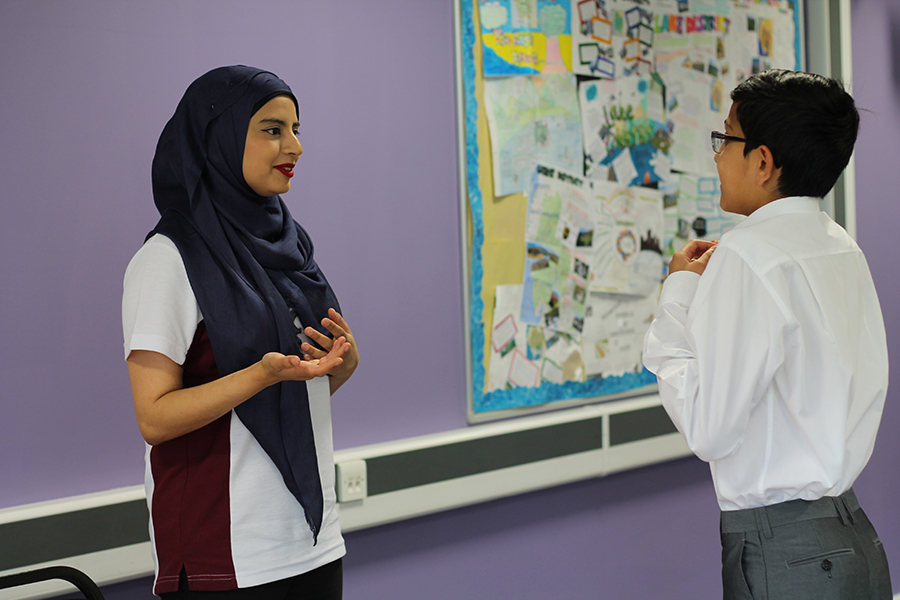Speech and language therapy
Speech and language therapy is concerned with the assessment, diagnosis and treatment of speech, language, communication and swallowing difficulties. Speech and language therapists treat individuals of all ages and abilities.
What is speech and language therapy?
Speech and language therapy is a healthcare profession which assesses, diagnoses and treats speech, language, communication and swallowing difficulties in babies, children and adults.
The main goal of speech and language therapy is to maximise an individual's ability to communicate to their highest potential in their everyday life. Speech and language therapy also maximises an individual's ability to eat, drink and swallow as safely and independently as possible.

SLT Session
What is a speech and language therapist and what do they do?
Speech and language therapists are health professionals who assess, diagnose and treat speech, language, communication and swallowing difficulties. Speech and language therapists are registered with the HPC (health professions council) and are members of the Royal college of Speech and Language Therapists.
Speech and language therapists treat both children and adults with a variety of conditions and problems which result in speech, language, communication and swallowing difficulties. Common conditions and problems which speech and language therapist treat include:
- Neurological difficulties e.g. stroke, head injury etc.
- Learning difficulties
- Physical disabilities
- Developmental delay
- Developmental disorders
- Autistic Spectrum Disorders
- Head and neck cancer
- Mental health problems
- Language delay and impairment
- Hearing loss and impairment
Speech and language therapists treat a variety of difficulties as a result of the above conditions and problems, these include:
- Speech delays / disorders
- Communication difficulties
- Social communication difficulties
- Expressive language difficulties (verbal and written)
- Receptive language difficulties (understanding)
- Voice disorders
- Eating, drinking and swallowing difficulties
- Attention and listening problems
It is the role of the speech and language therapist to maximise an individual's communication to their highest potential. The speech and language therapist aims to improve, develop and support any speech, language, communication and swallowing difficulties.
The speech and language therapist will use a variety of treatment approaches when treating speech, language, communication and swallowing difficulties. The type of intervention used will be dependent on the type and severity of difficulties the individual is experiencing. Treatment plans will be individualised and tailored to the specific needs and abilities of the individual. Treatment may involve:
- Oral- motor exercises
- Eating, drinking and swallowing management
- Expressive language programmes
- Receptive language programmes
- Alternative and Augmentative Communication - any form of communication other than speech e.g. picture symbols, sign language and computer aids.
- Individual therapy
- Group therapy
- Social skills therapy
- Stroke rehabilitation
- Compensatory strategies
- Advice, support and training
The speech and language therapist will work closely with the patient, their parents / carers and other professionals involved in their care by providing advice, support and training on all aspects of the individual's treatment.
How do speech and language therapists treat Autistic Spectrum Disorders and other related conditions?
Speech and language therapists play a key role in the assessment, diagnosis and treatment of Autistic Spectrum Disorders (ASD) and other related conditions. Speech and language therapy is highly beneficial for individuals with Autistic Spectrum Disorders and other related conditions. Speech and language therapy will improve, develop and support any speech, language, communication and swallowing difficulties.
Communication is one of the main areas of difficulty experienced by individuals with Autistic Spectrum Disorder. Due to the variation in the type and severity of speech, language and communication difficulties amongst individuals with ASD, speech and language therapy intervention will be individualised for each individual.
Some individuals will have spoken language and may only experience difficulties in their social communication, whilst others will be completely non-verbal (unable to speak). Speech and language therapy may work on the following areas for individuals with ASD and other related conditions:
- Expressive language
- Receptive language
- Social skills
- Non-verbal communication (facial expressions, gesture and body language)
- Alternative and Augmentative Communication - any form of communication other than speech.
Speech and language therapy is highly beneficial for individuals with ASD and other related conditions and will focus on improving and supporting the individual's difficulties in their speech, language and communication.
Summary
Speech and language therapy is a health profession which is concerned with the assessment, diagnosis and treatment of speech, language, communication and swallowing difficulties. Speech and language therapy aims to maximise an individual's ability to communicate to their highest potential and eat and drink as safely and independently as possible. Speech and language therapy is a key intervention and is highly beneficial for individuals with Autistic Spectrum Disorder.
If you feel you would benefit from our speech and language therapy service and would like to book and appointment with one of our highly experienced speech and language therapists please email office@as dclinic.co.uk or call 03300 886 693.
